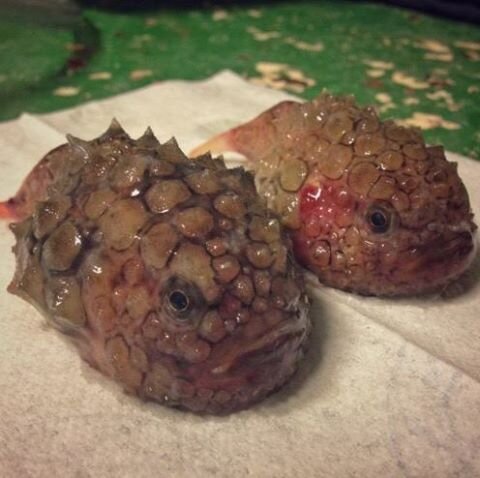New Mutant Monday Series Three (Pathfinder Edition) #9 - Elepods

Bizarre mutant fish found in the depths of most lakes and rivers across the globe. They are strictly fresh-water creatures and as such will never be found in the oceans, although rumor has it they have mutated further and are supposedly found in the shallow depths along the shores of the mouth of the Amazon River in South America.
These oddly shaped fish appear to be free-floating bits of flotsam, gently swaying in the currents of rivers, or floating just below the surface of lakes. They are uniformly brown in color and when the eyes are closed can easily be mistaken for seed-pods. They shell is somewhat rough-textured and more mature specimens have spiky protrusions, making it a rather dangerous task for creatures which wish to use them for food. A slit is located just below the mouth, which can often be missed.
Note - a special thanks to the author Scott Sigler for posting the image of this real-life critter on his Facebook page!
Bizarre mutant fish found in the depths of most lakes and rivers across the globe. They are strictly fresh-water creatures and as such will never be found in the oceans, although rumor has it they have mutated further and are supposedly found in the shallow depths along the shores of the mouth of the Amazon River in South America.
These oddly shaped fish appear to be free-floating bits of flotsam, gently swaying in the currents of rivers, or floating just below the surface of lakes. They are uniformly brown in color and when the eyes are closed can easily be mistaken for seed-pods. They shell is somewhat rough-textured and more mature specimens have spiky protrusions, making it a rather dangerous task for creatures which wish to use them for food. A slit is located just below the mouth, which can often be missed.
These little fish are content to float around in the water, consuming whatever food come their way. They are scavengers and live off the ample sources of dead organic matter the rivers and lakes provide. When they are forced to swim, they can move quickly and often escape potential harm before anyone knows they are even close by.
It does not matter the time of year; these creatures will breed whenever the urge presents itself. Unlike most types of fish, which lay eggs and then the male fertilizes them, they engage in active sexual intercourse. The female will become pregnant and after 28 days give birth to 4d8 live young. The ‘frys’ always stay around the mother for the first sixty-two days of their existence, at which time they finally grow enough to be able to survive on their own. When this happens they will flee into the waterways.
Due to the fact these creatures are actually fairly social animals, sometimes several females will mate at the same time, either with different males or one single male, so it is not uncommon to see these creatures huddled together with tiny clouds darting in and out among them.
Although they are content on simply consuming the detritus which is easily found in waterways, they have been known to become curious and sometimes will attack anything with open wounds or creatures which are smaller.
If they are frightened or feel a target is too powerful, they are able to use a powerful elemental attack (see above). It should be noted the creatures are immune to the effects of thermal and cold.
CR: 3
XP: 800
Small animal
Alignment: neutral
Init: +2; Senses: low-light vision; Perception: +3
AC: 15; Touch: 13; Flat-footed: 13 (+1 size, +2 dexterity, +2 natural armor)
HP: 25 (3d8+12)
Fort: +5; Ref: +3; Will: +1
Immunity: Thermal and Cold
Speed: 30 ft.
Melee: 1 ram, +4 3d6+2 (crit 18-20 x2), 1 bite +4 3d4+2
Space: 5ft. Reach: 5 ft.
Spell-like abilities: Temperature control (Su)
Stats: Str:14, Dex:14, Con:16, Int:1 , Wis:10 , Cha:6
Base Atk: +2 CMB: +3; CMD: 17
Feats: Alertness, athletic
Skills: Swim +7
Languages: None
Environment: Freshwater rivers and lakes
Organization: School (1d12)
Treasure: None
Special abilities:
Tearing Bite (Ex) – These creatures will attempt to bite, a target and despite their size, their mouths are filled with incredibly sharp teeth, which inflict terrible wounds. Anyone bitten by the creature must make a Fort save (DC 13) or lose 1d3 hit points per round, per wound, due to the bleeding the wounds cause. This can be alleviated by simply binding the wounds, taking one round per wound.
Temperature Control (Sp) – They can choose to use either thermal or cold, and are able to pick any spot in their visual range. By concentrating, they are able to heat or freeze a single 15 foot section of water. Anything caught in the area of effect will suffer 5d6 thermal or cold damage as a result. If the target is incapable of moving, they will suffer this every round! The creature can keep this up as long as it concentrates, and if it is attacked, it requires a concentration roll to keep the ability active. Targets caught within the area of effect are allowed a Reflex save (DC 13) for half damage.
Water Ram (Ex) - They will attack by ramming a target, striking them with their spiked and armored bodies. Often the creatures will try to target the head of their victim. On a confirmed critical hit, the creature hits the target’s head, inflicting double damage and the target must make a Fort saving throw (DC 13) or be knocked unconscious for 1d6 rounds – which could lead to the target drowning, if they are air-breathers. They will use this ram attack at the beginning of combat, and it is not uncommon for a whole school to attack the same target.